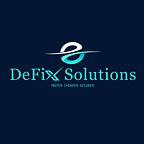Decentralized Finance in a Nutshell
Crypto has grown into a billion dollars business, causing a wave of financial disruption throughout the world. As we can see, there is a long history of invention dating back to the 1980s. Cryptography is on the rise like never before. The very first and the most popular cryptocurrency “Bitcoin” has made its particular position in the market following the last decade. Unfortunately, the financial regulations and other services appeared a bit slow for Bitcoin. Primarily owing to its inherent flaws and lack of acceptance, and because of its considerable price fluctuation, financial institutions will not accept a Bitcoin loan, making Bitcoin a worthless asset for any investment.
The cryptocurrency market is on the rise, and decentralized finance (Defi) is a hot topic right now — it’s an exciting place to be, for sure. Let’s delve a little more into Defi and discover more about it if you’re still skeptical.
Understanding decentralized finance:
(Defi) short for decentralized finance, is an encompassing term for a range of public blockchain applications and initiatives seeking to overthrow the existing financial sector. Defi refers to financial applications based on blockchain technologies, often utilizing smart contracts, and is inspired by blockchain technology. Smart contracts represent legal contracts that are automated and can be accessible by anyone with internet access. They do not require any middlemen to execute and can be accessed by anyone with an online connection.
Through stigmatizing facilitators and censors and empowering regular people through peer-to-peer trades, Defi undermines the centralized financial sector. Defi refers to applications and peer-to-peer protocols built on decentralized blockchain networks that allow for easy lending, borrowing, and trading of financial instruments without requiring access rights.
The initiative started in 2009 following the launch of Bitcoin. The very own idea was to bring a transformation towards the conventional financial sector with the help of Blockchain. Things got straight in 2015 with the spectacular launch of Ethereum, which is a second-generation blockchain. It commenced by optimizing the advancement inside the financial sector, as well as encouraging firms and organizations to develop and deploy (Defi) related initiatives.
Tremendous growth and its future:
Defi now matured into a full network of functional applications and standards that benefit hundreds of thousands of people. Defi ecosystems already hold over more than $25 billion in assets, making it one of the quickest portions of the public blockchain landscape.
Defi is being included in a wide range of financial operations, both fundamental and complicated. It’s controlled through decentralized applications known as “apps” or other software known as “protocols.” Transactions in the two most popular cryptocurrencies, Bitcoin and Ethereum, are handled via Dapps and protocols.
Perhaps the first time in human history, the people of the globe are shaping a global financial system. Everyone may participate in Defi protocol governance and have a seat at the table where the world of decentralized finance is being built. Despite some of the challenges that come with working on the cutting edge of innovation, the world of decentralized banking is on the road to success.
